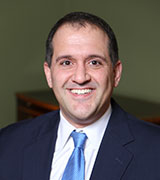THESSALONIKI AND THE 21ST CENTURY VIA EGNATIA

by Endy Zemenides
During the Roman Empire, one of the most important routes linking Italy and Byzantium – serving as a key communications artery, military route, and key trade and commerce highway – was the Via Egnatia. Connecting to the Appian Way (and thus to Rome), the Via Egnatia crossed the Balkans – traversing through what is today Albania, North Macedonia, Greece, and Turkey. The main stop just about half-way along the road was Thessaloniki.
From the very beginning, Thessaloniki was very much a “global” city. Named after Alexander the Great’s sister, the imperial significance of the city has been constant. It served as “Συμβασιλεύουσα” (Symvasilévousa) or “co-reigning” city (with Constantinople) of the Byzantine Empire. Its geographical location (especially its ability to link key land and sea routes) and its cultural DNA (both as a place of co-existence between Christians, Jews and Muslims and a crossroads between East and West) made it quite a prize. Indeed, control of Thessaloniki was one of the main goals for several antagonists in the Balkan Wars. Every time southeast Europe was part of a paradigm shift in global politics, Thessaloniki was in the eye of the storm.
Such a paradigm shift is underway once again. A de facto world war is underway, and southeast Europe is the midpoint of the conflict in Ukraine and the conflicts in the Middle East. On the sidelines of September’s Thessaloniki International Fair, the Delphi Economic Forum, Kathimerini, HALC, and TIF HELEXPO convened a roundtable discussion on the global role of Greece’s second city. “Thessaloniki: The New Omphalos of the World” brought together East and West, North and South, Christianity-Judaism-Islam for a discussion on the impactful role that Thessaloniki is poised to play.
Greece’s Deputy Foreign Minister, Ambassador Alexandra Papadopoulou, was joined by the Ambassadors of the US, George Tsunis, the United Arab Emirates, Ali Obaid Al Dhaheri, India, Rudrendra Tandon, Israel, Noam Katz, as well as the US Ambassador to Cyprus, Julie Fisher, Angelina Eichhorst of the European Union and others for this unprecedented discussion. The symbolic importance of all these participants should not be lost on anyone: representatives of the key players in multiple diplomatic initiatives – the Three Seas Initiative, the Abraham Accords, the “3+1”, the Eastern Mediterranean Gas Forum – had transformed Thessaloniki (at least for that day) as the midpoint of the 21st century Via Egnatia.

The geopolitical advantages that Greece brings to the table in this shifting world order have been discussed in these pages for a while now, but Thessaloniki’s specific advantages should be zeroed in on. And the Greek American community should be planning for how to multiply these advantages.
- LOCATION, LOCATION, LOCATION
We’ve already noted the advantage of Thessaloniki’s geography, but a quick survey of license plates (and what countries they are from) on the road to Thessaloniki should unlock one’s imagination. Linking the port of Thessaloniki (which is the planned entry point into Europe for the India-Middle East-Europe Economic Corridor) to Europe’s main roadways can give northern Greece a huge boost in economic growth and influence, soft power and geo-strategic importance. Working with the US government to incentivize American investors to acquire and upgrade the port of Thessaloniki must be a priority for the Greek American community.
- PEOPLE TO PEOPLE
Most of the achievements in the “best ever” bilateral ties have occurred at the government-to-government level. Thessaloniki presents the greatest opportunity to seize on the commitment by the US and Greece to dramatically expand people to people ties.
Nearly half of Thessaloniki’s population is either students or part of the academic community. It is a natural center for American universities looking to expand their presence in the region (once Greek completes its education reform). Such a talent pool also makes Thessaloniki the most attractive destination in the region for American companies. The success of Pfizer, Cisco and Deloitte setting up shop in Thessaloniki can show the way.
Finally, Thessaloniki and Macedonia have untapped potential for American tourism. Cultural tourism, gastronomy tourism, wine tours, “footsteps of St. Paul tours”, underrated beaches – our community (and the Tourism ministry) should be working overtime to entice the imagination of Americans when it comes to visiting Thessaloniki. And it should start with prioritizing a direct flight to Thessaloniki’s marvelously upgraded international airport.
The world is coming together in Thessaloniki. We have a Greek government that is prioritizing growth in the region, an enterprising and energetic Mayor of Thessaloniki, and an amazing son of Thessaloniki in Albert Bourla that can – in so many ways – be the ultimate validator for Thessaloniki’s potential. We cannot let this moment pass.











0 comments